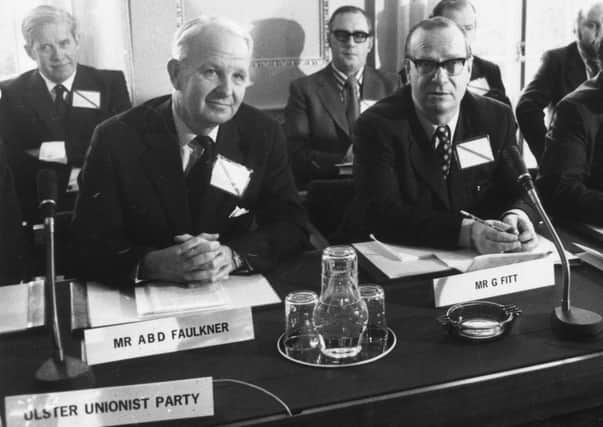Civil servant memoir: ‘After the collapse of power-sharing, we felt that our work had been in vain


To those of us who had served the power-sharing executive, its collapse in 1974 was catastrophic.
Not only had our work been in vain, but our future careers were uncertain.
We were in limbo.
Advertisement
Hide AdAdvertisement
Hide Ad

Ever courteous and appreciative of his staff, Brian Faulkner had us, and our wives, down to his home at Seaford for a farewell dinner.
A teetotaller himself, he handed over the responsibility for serving drinks to our gregarious PR man, Tommy Roberts.
In due course I was absorbed into the Central Secretariat.
One of my main jobs was to act as Joint Secretary to the Joint Security Committee, by now chaired by Merlyn Rees.
The main participants were the security minister, the general officer commanding (GoC) for Northern Ireland and the RUC chief constable. The GoC brought his military advisor — a lieutenant colone – and the chief constable brought his staff officer, Jimmy Crutchley.
Advertisement
Hide AdAdvertisement
Hide AdThe other joint secretary was an NIO civil servant, Carol Jackson. We four juniors got on well together and compared notes to ensure that we all went back to base with the same memory and record. (Carol liked Northern Ireland so much that he settled in Bangor and brought up his family there).
Somewhere in 1975, Ken Bloomfield told me that there was an offer for me to go on promotion to the Department of the Environment.
I had a few days of uncertainty. I loved being at the centre of political life and felt very much at home there. But for five years, because of so much out-of-hours working, I had been neglecting my family.
My boys still reproached me for not coming to see their rugby matches at Cabin Hill and Campbell. My wife June had had to bear an unfair share of running the family home.
Advertisement
Hide AdAdvertisement
Hide AdI liked Gerald Malcolm the Scot who was the permanent secretary at environment. I had four youngsters to finance through university. And time was running out for me in the promotion field. At age 50 this might be my last chance. I took it.
As the old song goes: ‘It’s time I was moving. It’s time I was gone.’
•Sinclair Duncan adds: This is not a political analysis. Better brains and pens have done this years ago. This is rather a worm’s eye view of people and events as seen by a lesser mortal on the staff in Stormont Castle. For more serious reading.
Memoirs of a Statesman — by Brian Faulkner (ghost- written)
Stormont in Crisis – A memoir by Sir Kenneth Bloomfield
Ringside Seats – by Robert Ramsay, a senior civil servant in Stormont and Brussels
Advertisement
Hide AdAdvertisement
Hide Ad• Sinclair Duncan was in the NI Civil Service from 1949 to 1985. He worked in the ministries of Education, Finance and Agriculture, the Cabinet Office, Office of the Executive, NIO and the Department of Environment. This memoir has been published daily in the News Letter this week and is also being put online as below
Advertisement
Hide AdAdvertisement
Hide Ad• Part four: Irish Americans were reminded that they had confiscated lands too, more brutally and successfully
——— ———
A message from the Editor:
Thank you for reading this story on our website. While I have your attention, I also have an important request to make of you.
Advertisement
Hide AdAdvertisement
Hide AdWith the coronavirus lockdown having a major impact on many of our advertisers — and consequently the revenue we receive — we are more reliant than ever on you taking out a digital subscription.
Subscribe to newsletter.co.uk and enjoy unlimited access to the best Northern Ireland and UK news and information online and on our app. With a digital subscription, you can read more than 5 articles, see fewer ads, enjoy faster load times, and get access to exclusive newsletters and content. Visit https://www.newsletter.co.uk/subscriptions now to sign up.
Our journalism costs money and we rely on advertising, print and digital revenues to help to support them. By supporting us, we are able to support you in providing trusted, fact-checked content for this website.
Alistair Bushe
Editor